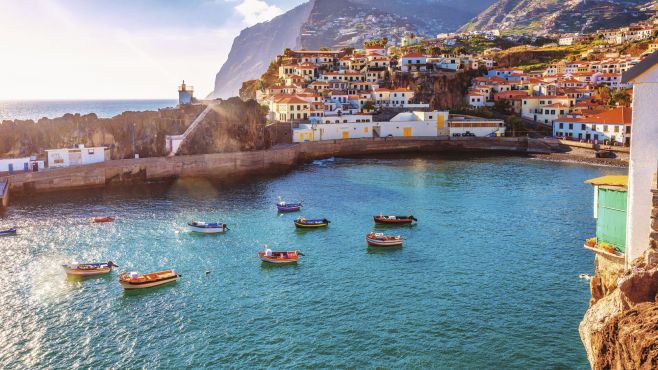In 2009 Portugal introduced an attractive tax program for foreign citizens. The NHR (non-habitual resident) program, allows citizens from is attractive to professionals, pensioners, investors and entrepreneurs who want to enjoy a life free of income tax. The government of Portugal offers tax benefits to everyone, with a unique advantage: no minimum stay requirement in the country.


Chris started Globalization Guide to help entrepreneurs like himself to master the challenge of international business and living abroad. Since then he has helped hundreds of clients with their international structuring.
[toc]
Eligibility
In the following section I am going to cover, who is eligible to use the Portugal NHR regime.
Nationality
The NHR program is in principle open to nationals of any country, including non-EU/EEA citizens. All you need to do is to be able to meet the Portuguese residency requirements.
Because of the EU freedom of movement, it will be much easier for EU citizens to establish their residence in Portugal, of course.
Foreign entrepreneurs can become tax residents in Portugal by simply applying and receiving the non-habitual residency status without even stepping a foot there. The tax-residency makes your income tax free in Portugal in the origin of country where you earned the income. Under this same program, foreign businesses can apply for a “Golden Residence Permit”. This permit is allowing you to enter and stay in the country without a visa. Also, it allows you to travel to the nations that are Schengen-affiliated.


The foreign companies will benefit whether you or your Portuguese partners receive the tax break. The tax breaks for your partners would mean lower prices for you. To put it all up, the Golden Permit Program makes travel cheap and simple.
Requirements
An individual must meet the following criteria in order to qualify for the NHR status:
- The individual must become a Portuguese resident taxpayer.
- The individual must not taxed as residents in Portugal in the preceding five years.
The granting of NHR status is not automatic. To achieve this, you should submit all the conditions. If you wish to be a fiscal resident in Portugal, it is a must to follow rules. This is beneficial for travelers and digital nomads who travel often.
You only have to meet one of the following requirements:
- Stay for a minimum of 183 days in the country. You can choose if it’s consecutive or not
- Have an available house and an intention to live there
- Be a part of a Portuguese ship or aircraft crew
- Have children or a spouse in the country
- Have an employment abroad by the Portuguese state
In specific, the choice merely having a house rental is pretty attractive. Keep in mind that there are no minimum requirements in terms of the purchase or rental price of the property, it can be a good solution. A monthly €150 cheap room in Portugal is sufficient if it is understood that you have the intention to live there. As practice, visiting this house at least once a year is a must and perhaps use it as postal address or storage.
NHR Status
If you are granted the NHR status, you will have it for 10 years. You should apply on the 31st of March of the next tax year. You may want to hire a lawyer who specializes in Portuguese NHR residency because this saves you time and aggravation. Owning a house and renting it out through an agency is an ideal thing you can do if you don’t want to live in Portugal. If your contract allows it, you can even sublet your rented home. You can even make a profit from it.


10 years a tax exile
NHRs benefit from the following tax exemptions for income obtained overseas:
- Professional income
- Private retirement pensions
- Royalties, interest, real estate capital gains and dividends
All the local sourced income will be taxed in Portugal. This includes:
- Professional income by 20%. This is possible when it is from the entrepreneurs.
- Property’s income by 20%.
- Real estate capital gains by 50% of the capital gain at the progressive Portuguese tax rate
- Capital gains by 28%
- All other kinds of income will leniently apply up to 48%
Portugal’s tax resident
As a tax resident, you receive an official tax residency certificate that will make your tax status is non-controversial. Maintaining your Portugal tax residency is possible
without spending more than 6 months each year in Portugal. This is through organizing your travels where you don’t trigger tax residency in any other country where you spend time.
In addition, a Portuguese citizen might be needed where some instances would lead to the supposition of keeping and occupying it as a habitual home as your main intention. So, proper care is a must. As to the handling of correspondence that you will get at your Portuguese address. This includes the Portuguese tax authorities.


Main characteristics of the NHRM
- Income from Portuguese Source
The non-habitual residents who obtain employment income (category A) and professional or business or (category B) in Portugal derived from high added value activities. 20% flat rate will be issued to activities that are artistic, scientific, or technical nature. This is applicable to the net amount of income earned. The taxpayers might exercise their option to open this income to accumulation.
The Ministerial Dispatch no. 12/2010, of 7 January, defined what high added value activities of artistic, scientific, or technical nature. The latter included activities that are being developed by engineers, similar technicians and architect; musicians, plastic artists and actors; tax consultants and auditors; dentists and doctors; university professors; psychologists; technicians, liberal professionals, and assimilated; and company managers, administrators and investors.
Income from foreign source
- Category A income
Exempt from taxation:
- If the same is taxed in the State of origin according to the Double Tax Treaty entered into between that State and Portugal; or
- If Portugal has not entered into a Double Tax Treaty with that State of origin, tax will be issued on the income. According to the domestic law, the income isn’t considered as an earned in Portugal.
- Category B income income from high added value activities obtained abroad by non-habitual residents, as well as, from providing information about an experiment carried out in the scientific, industrial, or commercial, capital income (category E), real estate income (category F) and capital gains (category G)
Exempt from taxation:
- If the income may be taxed in the country of origin according to the Double Tax Treaty entered into between Portugal and the State concerned; or
- The tax income is taxed in conformity with the OECD Model Tax Convention. In case of Portugal has not entered into between a Double Tax Treaty with the State of origin.
- Pensions income (category H)
Exempt from taxation:
- If the same is being taxed in the State of origin entered into between Portugal and that State; or
- Overseas income
Portugal’s NHR tax regime
The NHR tax regime in Portugal is more complicated than the programs in other countries. As mentioned, you can only enjoy these tax benefits for 10 years. Anyone who wants to continue living tax-free after this period of time will have to relocate their residence once again. However, there are a lot of cases in which settling down in Portugal can be worthwhile.
NHR status is not appearing on the Portuguese residency permit and, in the eyes of your country of origin; you live in a Western country with high-taxation. In other words, this is for certain that no tax inspector who will find fault with you emigrating there.
Furthermore, the country is highly attractive and diverse. Portugal is a modern country where you will find everything you need. Also, it has one of the most advanced personal freedom policies in the world. For example, activities such as drug use and are legal. There hardly any absolute restrictions on homosexuality, alcohol, etc.


Even as emergency refuge, Portugal and its islands do not only offer warm weather for the entire year. Also, it has a great nature and the ability to survive self-sufficiently.
Conclusion
Portugal’s Non-Habitual Residency regime is one of the most attractive residency options that emerged in the recent years. Also, its Golden Visa for non-EU citizens. For non-EU citizens, its investment amount of EUR 200,000 is low. It opens the way to a much-prized EU passport with free movement across the entire Schengen zone.
Finally, the low physical presence required to stay as qualified for Portuguese tax status. This allows an incredible freedom of movement. Also, it makes the regime ideal for roaming developers and entrepreneurs who receive income from other business centres.



Hi! I’m wondering if you could shed some light on a potential scenario. Let’s say an entrepreneur from another EU country becomes a NHR in Portugal and operates an UK LLP from there. In practice, the UK LLP doesn’t tax profit when it’s foreign earned. But would Portugal consider this foreigned earned income, or local income because the company was effectively managed in Portugal? Thanks!
Hi , if I take advantage of minimum stay requirements under NHR for 10 years , how can I then become a Portuguese citizen which requires 5 uninterrupted years stay ?
Thanks ,
Mike Aley
Portugal is in fashion right now, BUT I as Portuguese can say that I know my country very well. Believe me, only the natural beauty, the beaches and the good weather is not enough to be happy. Services work very poorly, Doctors, Hospitals and poor quality clinics, dirty streets, very expensive real estate, crime increases day by day, food pesticides, Islamist invasion, poverty, communism, and high taxes. I do not recommend